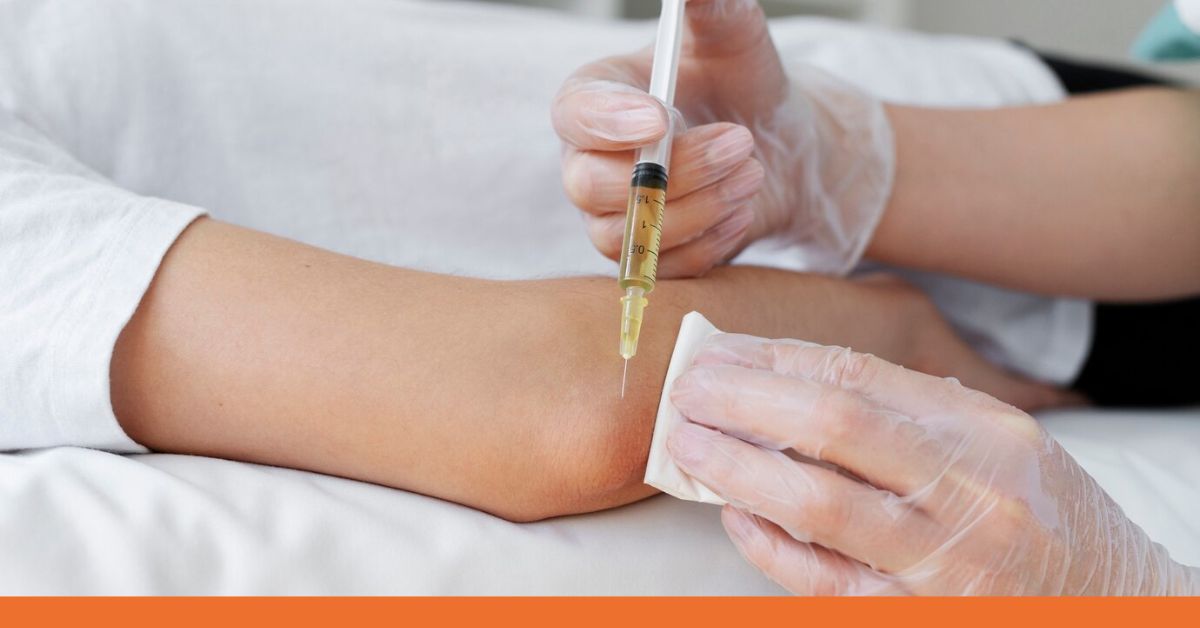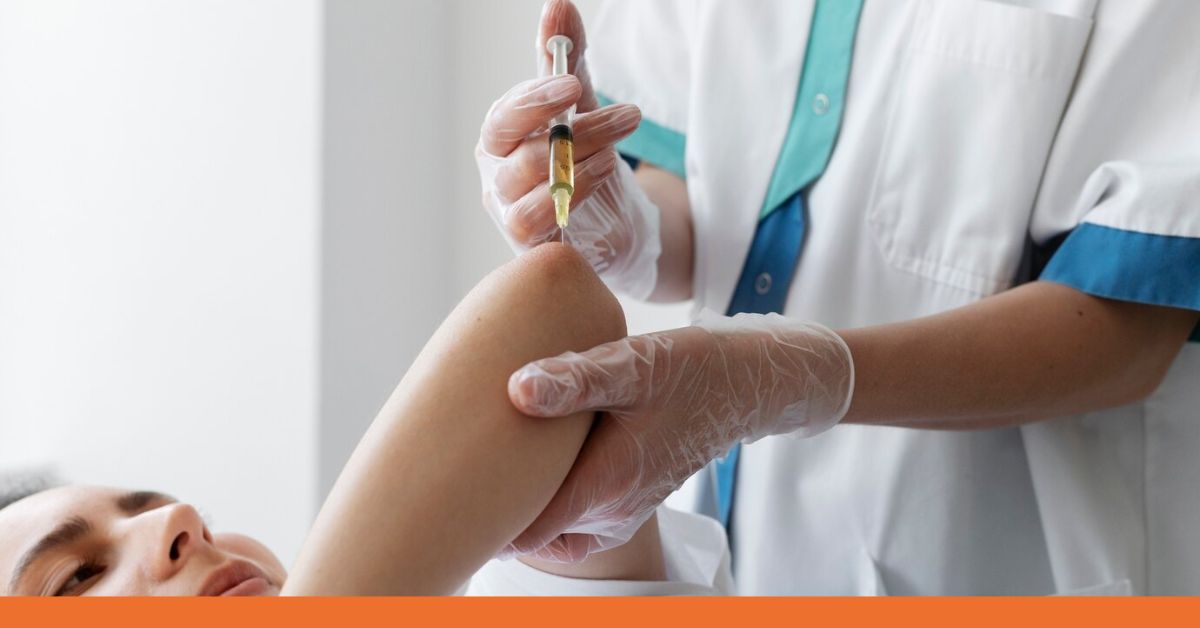
Joint pain, especially in the knees, is a prevalent issue that numerous individuals encounter, especially as they grow older. The pain can range from mild discomfort to debilitating pain that hinders daily activities. For those in Fairfield, CT, seeking relief, a primary care doctor might recommend injections as a treatment option. But why are injections recommended, and how do they work?

✔ Immediate and Targeted Pain Relief: Joint injections offer direct relief by targeting the specific area of pain, ensuring rapid and effective alleviation of discomfort.
✔ Reduced Need for Oral Pain Medications: With the potent relief provided by joint injections, patients often find a decreased reliance on oral painkillers, promoting better overall health.
✔ Prolonged Effects of Joint Injections: Unlike many temporary relief solutions, joint injections can provide pain relief that lasts for weeks or even months, making it a preferred choice for sustained comfort.
✔ Minimal Side Effects of Joint Injections: Joint injections, when administered correctly, come with a significantly lower risk of side effects compared to other treatments, ensuring a safer pain management solution.
✔ Potential for Improved Joint Function: Beyond pain relief, joint injections can enhance mobility and overall joint function, allowing patients to return to their regular activities and enjoy a better quality of life.
✔ Cost-Effectiveness in the Long Run: While joint injections have an upfront cost, their long-lasting effects and reduced need for other treatments make them a cost-effective solution in the broader scope of pain management.
Joint pain can strike without warning. The pain can be intense and unrelenting, whether it’s a result of a sudden injury, an exacerbation of an existing condition, or the onset of a new ailment. This pain can severely limit mobility and quality of life, from simple tasks like walking or climbing stairs to more complex activities like exercising or playing sports. For residents of Fairfield, CT, seeking immediate and targeted relief, injections recommended by a primary care doctor in Fairfield, CT, can be a game-changer.
Here’s why immediate relief from a primary care doctor in Fairfield, CT, is crucial:
There are several types of injections that a primary care doctor in Fairfield, CT, might recommend, each with its unique benefits:
Oral medications have long been the go-to solution for many. However, with advancements in medical science and a deeper understanding of pain mechanisms, there’s a growing shift towards alternative treatments. For residents of Fairfield, CT, one alternative that a primary care doctor in Fairfield, CT, might recommend is injections for joint pain relief. This method offers immediate relief and significantly reduces the need for oral pain medications.
While oral pain medications, such as NSAIDs (Non-Steroidal Anti-Inflammatory Drugs) and opioids, have been effective in managing pain, they come with their set of challenges:

When a primary care doctor in Fairfield, CT, recommends injections for joint pain relief, it’s often intending to reduce or eliminate the need for oral medications. Here’s how injections achieve this:
The quest for long-lasting pain relief has been a primary concern for many individuals suffering from joint pain. Traditional methods, while effective, often provide temporary relief, necessitating frequent treatments or medication intakes. However, injections for joint pain relief, as recommended by many a primary care doctor in Fairfield, CT, have been a beacon of hope for many due to their prolonged effects.
To understand why injections from a primary care doctor in Fairfield, CT, offer prolonged relief, it’s essential to grasp the science behind them:
When a primary care doctor in Fairfield, CT, recommends injections, patients often inquire about their duration of effectiveness. Here’s a comparison:
The efficacy of a procedure is often weighed against its potential side effects. For individuals grappling with joint pain, the quest for relief can sometimes lead to treatments that, while effective, come with a host of unwanted side effects. However, when a primary care doctor in Fairfield, CT, recommends injections for joint pain relief, one of the standout benefits is their minimal side effects.
Several factors contribute to the minimal side effects of joint injections:
While the side effects are minimal, patients can take certain precautions to reduce their risk further:
Joint pain is not just about discomfort or the physical sensation of pain. It’s also about the limitations it imposes on mobility and overall joint function. For many individuals, the inability to move freely or engage in activities they love can be even more debilitating than the pain itself. Fortunately, when a primary care doctor in Fairfield, CT, recommends injections for joint pain relief, there’s not only the promise of pain alleviation but also the potential for significantly improved joint function
To appreciate the potential improvements in joint function post-injection, one must first understand the basics of joint anatomy and function:
When a primary care doctor in Fairfield, CT, administers joint injections, the primary goal is pain relief. However, the secondary and equally vital outcome is improved joint function. Here’s how:
The cost of treatment is a significant concern for many patients. While the immediate out-of-pocket expenses are often the primary focus, it’s essential to consider the long-term cost implications of any medical intervention. When a primary care doctor in Fairfield, CT, recommends injections for joint pain relief, one might wonder about the cost. However, when viewed from a long-term perspective, these injections can be highly cost-effective.
Before exploring the long-term cost-effectiveness, it’s essential to understand the immediate costs:
When evaluating the cost-effectiveness of joint injections, it’s crucial to consider the costs associated with alternative treatments:

The frequency of joint injections largely depends on the type of injection and the individual’s specific condition. Typically, corticosteroid injections are limited to three or four times yearly to prevent potential side effects. Hyaluronic acid injections might be administered in a series over several weeks. Always consult your primary care doctor in Fairfield, CT, for personalized recommendations.
After receiving a joint injection, avoiding strenuous activities for a few days is generally advised to allow the medication to settle and prevent potential irritation. High-impact exercises, heavy lifting, or prolonged standing might be discouraged initially. However, gentle movements and stretches can be beneficial. Your primary care doctor in Fairfield, CT, will provide specific guidelines based on your situation.
Yes, joint injections can often be combined with other treatments for a comprehensive approach to pain management. Physical therapy, in particular, complements the effects of injections, helping strengthen muscles and improve joint function. Additionally, lifestyle modifications, like weight management and a balanced diet, can enhance the benefits. Discuss any potential combinations with your primary care doctor in Fairfield, CT.
There’s typically no extended recovery period after a joint injection. Most patients can resume their daily activities shortly after the procedure. However, some might experience temporary soreness or swelling at the injection site, which usually subsides within a day or two. It’s always best to follow any post-procedure guidelines provided by your primary care doctor in Fairfield, CT.
Determining the suitability of joint injections involves thoroughly evaluating your joint pain’s cause, severity, and duration. Factors like overall health, age, and any underlying conditions also play a role. A detailed consultation and assessment with a primary care doctor in Fairfield, CT, will help determine if joint injections are an appropriate treatment option for you.
While joint injections are generally safe, as with any medical procedure, there are potential risks. Some individuals might experience allergic reactions to the medication used. There’s also a minimal risk of infection at the injection site. Rarely, the injected medication might spread to nearby tissues. It’s essential to discuss any concerns with your primary care doctor in Fairfield, CT, to understand these risks fully.
Joint injections offer significant relief but are not typically a permanent solution. The duration of relief varies based on the type of injection and individual factors. Some patients experience relief for several weeks, while others benefit for months. For long-term pain management, your primary care doctor in Fairfield, CT, might recommend a combination of treatments, including injections, physical therapy, and lifestyle changes.
Most patients can drive themselves home after receiving a joint injection. However, if the injection is administered in a joint crucial for driving, like the knee or wrist, it might be advisable to arrange for transportation. It’s always best to check with your primary care doctor in Fairfield, CT, beforehand and make necessary arrangements to ensure safety.
At DOCS Urgent Care & Primary Care Fairfield, our team of dedicated professionals, led by experienced primary care doctors in Fairfield, CT, is committed to providing you with the best care tailored to your unique needs. Your path to lasting relief begins with us. Schedule your appointment today!


During this surge in COVID-19 cases, our primary focus is meeting the high demand for tests, and we are seeing higher than usual wait times. This means we are unable to answer most phone calls. Please know that our teams are working very hard during this time to care for as many patients as safely as possible. Please click the button below for answers to common questions. We appreciate your understanding.